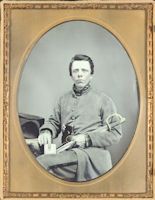Friday, 24th.—Left Enterprise at 8 A. M.; arrived at Mobile at 8 P. M.
Wednesday, July 24, 2013
July 24 — We left Enterprise yesterday morning at 8 o’clock a.m. and arrived at Mobile at 8 o’clock p.m. and lay by through the night. 7 o’clock a.m. We are now passing up Tom Bigbee on the boat. WRC
Vicksburg, Friday, July 24. General Herron’s command returned from their expedition to Yazoo City, having cleared the rebs out gloriously. They captured several thousand bales of cotton and negroes innumerable. The flat by the river as we go to water is covered with women and children of all hues and sizes, a grotesque scene, the men having been pressed into the service.
Eben Davis of the 20th Iowa visited us—was with us all the morning and took dinner with us. Evie some better. Heard the news of William Jones’s death.
July 24. — The general sent Lieutenant Carson out to Waterloo with 20 cavalrymen, and five companies of infantry as a support. He saw nothing of the enemy except a straggler, whom he captured and sent in. He went a mile across the river, and then returned. He heard heavy firing towards Culpeper, proceeding from our cavalry, who crossed above here. In the evening Mrs. Wallach and her daughter came in from Culpeper. They said that when they left Culpeper there were no troops there. The firing was from our cavalry fighting infantry, near Annisville. General Ingalls arrived here this evening, and I obtained a paper from one of his party, the first I have seen for a week. I took a walk through the town during the afternoon. Saw some pretty girls, who would not even glance at us, however. The town is quite a pretty one, and has some neat cottages in it. Some of them reminded me very much of the houses on the Beverly shore. The population of Warrenton before the war was 2000. At present it cannot be over 600, and these mostly women and children. Almost all the families here are in mourning, but almost invariably, so I am told, give as the reason for wearing black, that some aged relative has died. I suppose they think that the Yankees would be glad to know of any one being killed in battle, and so refuse to tell.
by John Beauchamp Jones
JULY 24TH—Nothing from Lee, or Johnston, or Beauregard, or Bragg—but ill luck is fated for them all. Our ladies, at least, would not despair. But a day may change the aspect; a brilliant success would have a marvelous effect upon a people who have so long suffered and bled for freedom.
They are getting on more comfortably, I learn, on the Eastern Shore of Virginia. Only about 25 of the enemy’s troops are said to be there, merely to guard the wires. In the Revolutionary war, and in the war of 1812, that peninsula escaped the horrors of war, being deemed then, as now, too insignificant to attract the cupidity of the invaders.
The Secretary of the Treasury sent an agent a few weeks ago with some $12,000,000 for disbursement in the trans-Mississippi country, but he has returned to this city, being unable to get through. He will now go to Havana, and thence to Texas; and hereafter money (if money it can be called) will be manufactured at Houston, where a paper treasury will be established.
Gen. Jos. E. Johnston has recently drawn for $20,000 in gold.
A letter from the Commissary-General to Gen. Lee states that we have but 1,800,000 pounds of bacon at Atlanta, and 500,000 pounds in this city, which is less than 30 days’ rations for Bragg’s and Lee’s armies. He says all attempts to get bacon from Europe have failed, and he fears they will fail, and hence, if the ration be not reduced to ¼ pound we shall soon have no meat on hand. Gen. Lee says he cannot be responsible if the soldiers fail for want of food.
July 24th. Marching orders. Broke camp. After a short march, go into camp on high ground near the Potomac River. Plenty of water here where we could bathe and wash our clothes, hang them on the bushes and wait for them to dry. We also used the river water to drink and make coffee. The current ran very swift at this point.
(During my army life I drank, made coffee, fished, bathed, washed my clothes, waded through, its blue waters. When clear it was blue as one looked at it. When storms came it was yellow, the color of Virginia and Maryland mud.)







